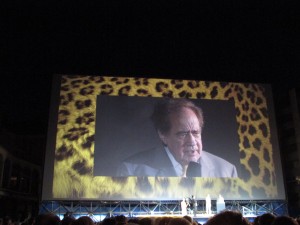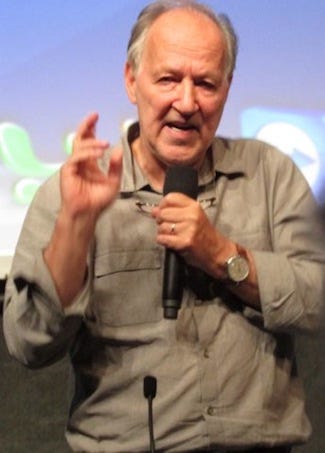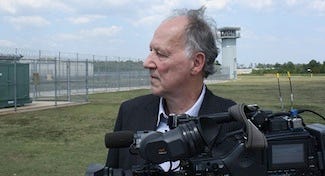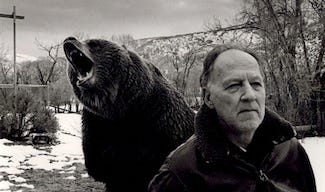
Award-winning Cinematographer Peter Zeitlinger
Speaks to Locarno Summer Academy Students.
Since 1996, award-winning cinematographer, filmmaker, screenwriter and editor, Peter Zeitlinger, has worked with Werner Herzog as his director of photography on many films, including Encounters at the End of the World, Grizzly Man, Into the Abyss, Cave of Forgotten Dreams, The Bad Lieutenant: Port of Call – New Orleans, On Death Row, and From One Second to the Next . The Czech born Zeitlinger fled the country as a child in 1968, during the Soviet occupation and moved to Austria.
Werner Herzog joined Peter Zeitlinger for the beginning of the seminar for students of the Summer Academy moderated by Academy Director Stefano Knuchel and Documentary Summer School Lab and Artists Workshop Director Nevina Satta. Hours later on the Grande Piazza stage, before an audience of thousands, Peter Zeitlinger presented Herzog with the Festival’s Pardo d’Onore Swisscom award.

Zeitlinger and Herzog
ZEITLINGER:
(Turns to Herzog, smiles.) As far as I remember, I was an ice hockey player. This was the main reason why you took me for the work with you. You mentioned
it several times.
HERZOG:
(Smiles at Zeitlinger.) It was for distracting attention. People asked me about deconstructing of images, esthetics. I said, ‘I don’t want esthetics. I
want a cinematographer who knows how to play ice hockey.’ (Looks at the students.) It put the stupid question to rest. Peter brings in esthetics. Esthetics
infiltrates film without thinking about it. The inner breath of a film.
Preparing for a Shoot
HERZOG:
We know the location beforehand, except the cave in Antarctica. Even in the cave you have to adapt quickly.
I don’t do much rehearsal with actors beforehand and don’t read the script with Peter. I’m completely unprepared. Peter comes unprepared because he doesn’t
know what I’m up to.
ZEITLINGER:
Sometimes Werner reads the script the day he shoots.
HERZOG:
With Peter we arrive on the set sometimes beforehand and a few things are pre-settled. Otherwise we work ourselves into the scene. Peter normally has a
camera and weaves into the choreography of the people. We have an attitude; the camera moves only when physical necessity of our curiosity.
ZEITLINGER:
You are not directing shot-by-shot, you are directing an event, and the scene is the event so it’s the world you create there, not just something that
happens for one particular shot. The main thing is to see the whole world, so you don’t see the filmmaking itself. It is important to see everything so you
don’t get a tunnel view.

(l-R, Stefano Knuchel, Zeitlinger, Herzog, Nevina Satta)
Zeitlinger Now Takes Center Stage
The first films (I made) I used to edit myself. I looked for storytelling that was very real. Every cut is a betrayal of the audience. You pretend
something that is not continuous. But I cannot handle this time-wise, so I gave up editing. For example, every four seconds in German TV, even if there’s
no need for it, they want a cut. You can’t work with the actors this way. They don’t like it.
Shooting On Death Row
Scary. Dark. There were a few cameramen working on this. Death Row was conceived like television; we never pretended it was cinematic. Even when I
tried to sometimes, Werner didn’t want that. He always destroyed it; he wanted the naked pure realism for this film. It would work less if it was
cinematic; it was stronger that it was so naked.
(Responding to a student’s remark: ‘I could see your shadow on the wall.’)
It’s a mistake. Mistakes are important material to work with. The word “mistake” is misleading; you think something is wrong, but it can be something
great.
Working Effectively on Set
For me it’s much more necessary for everyone who is there – who is pulling the dolly, who is acting, who is moving the backgrounds — everyone has to adapt
to mistakes of the others, and choose the mistakes for the right creation of the shot.
Trick yourself and others to be natural, to be relaxed. You have to do this with actors, with everyone who is in front of the camera. Because the camera
makes them nervous.
Shooting Celluloid versus Digital
It depends on the project. I think film will die somehow or preserved for some special events. Digital has lots of advantages, but also has a trap. When you keep the camera running, you can lose focus. When film is on, the money runs; when film is turned it off, the money stops. When you keep rolling, it’s just tape, all the aesthetic structure floats away. Try to shoot once, and shoot twice only when really necessary. Everyone has to find his own tricks. I like to trick everyone to shoot once, not to discuss — unless there is CGI.

On Herzog’s ‘Staging’ Documentaries
Werner is not staging a specific shot, he’s staging the situation. He’s interviewing a person, he’s staging him somewhere. He’s creating a world in his words. It’s his truth, which he is staging. He’s not telling people what to say. Never. I believe that he’s free of prejudice; he really asks a person, because he really wants to know things. He doesn’t think, ‘What do I need in the film?’ or ‘Where it should end in the film?’ He does not have this intention. That’s why I believe the people are giving so much.
More Highlights and Insights
· We have the responsibility to develop the view of the audience.
· I try to recreate what I see in reality and what I see in my dreaming.
· I am ‘just in this world’ looking into the lens; it is kind of safe because you’re not there. This is good for actors when you’re in this world, they
trust you; you’re not judging them.
· Authenticity — there are different ways to approach it. If you’re there a long time, they (characters) get used to it.
· Our profession is constantly changing. The profession of cinematographer will not be anymore; you have to be a visual creator.
· Responding to the question: ‘What was the film that you worked on that changed your life?’ Every film changes your life. Because you get two months
older.
Camera Movements and Choreography
Concerning camera movements it helps to know how to — (he pauses) — move. The use of camera. To be free. To surprise.
(Zeitlinger gestures a dance movement. A student then asks Zeitlinger to demonstrate how he moves with the camera, using Summer Academy Director Stefano Knuchel as the subject he’s filming. Zeitlinger obliges; he grabs his plastic water bottle, places it above his shoulder and moves seamlessly to, and then around Knuchel, and then back. A graceful and focused choreography. )
(Responding to the final question about his next project, Zeitlinger smiles.)
I am learning salsa.














